FROM DHAKA WITH LOVE: Reminiscences from the Days of IPBA
Juned A. Choudhury from the MPA Class of 1959 had a stint of training in France and joined Pakistan Shell Oil Co. in Chittagong rising to be a Director, having worked with Shell in Brunei and Malaysia. He now lives in Dhaka, "retired but not tired". His passion is to promote French language and culture; and as President of Alliance Francaise of Chittagong was decorated Knight of the Order of Arts and Letters by the Govt. of France. He is now actively engaged with an international recreational jogging club, Hash House Harriers, trekking, travelling, writing travel stories, with the mission of "bringing people together", humbly, the people of the sub-continent.
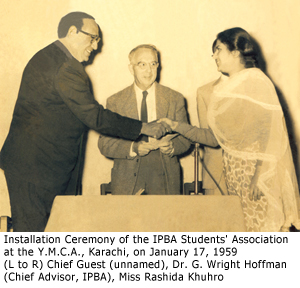
It was some time in 1957 while I was in the 3rd and
final year of B.A. (Hons) in Economics at Dhaka
University that I appeared at a 16-minute, 50-question
test and an interview with Dr. Virgil H. Stevens, and
was selected. Such true-false, multiple-choice tests
were unknown in Pakistan, nay, in the sub-continent, as
was the subject of Administration - Business or Public.
In Dhaka I was not a front-bencher in class and it was a
bit of an embarrassment both for him and me when our
'first-boy' was not selected. I suppose the test was for
aptitude for administration rather than academic
brilliance. "Selection" meant not only admission but a
full scholarship from Asia Foundation for two years.
Under this scheme, five students each from East and West
Pakistan were selected for MPA. The MBA program was open
to all, along with the remaining places in MPA.
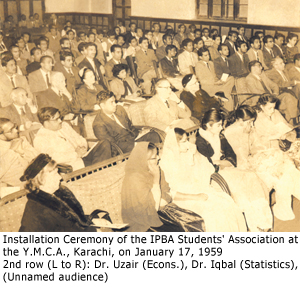
This, I suppose, was in the US AID scheme of things. The
idea of giving scholarships only for MPA was to
strengthen the Government administration by educating us
as potential senior bureaucrats. We were not only to be
qualified academically but also to be groomed in conduct
becoming a public servant. Once while driving past the
Beach Luxury Hotel, Dr. Stevens told me, "Last night my
wife and I attended a ball in this hotel. We had a good
time. When you will be in service you will also attend
such functions. That's all right, you also need
recreation, but you cannot afford to have scandals."
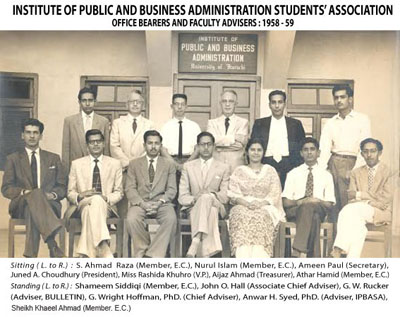
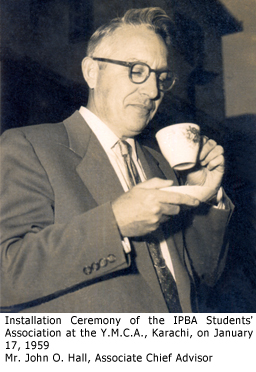
With all these activities and the pressure of surprise
quizzes, monthly tests, etc., there was not much time
left for any other extra-curricular activities. However,
at the winter break some of us from East Pakistan
visited Mohenjo-Daro and were hosted and entertained by
our classmate Dost Mohammad Unar at his village home in
Nawabshah.
During the October holidays, my late lamented friend
Kishin Bherwani from Hyderabad and I took a train
journey up to Khyber Pass, travelling 3rd class, living
on chapli kebab and nan, staying at a friend's house at
Model Town in Lahore, railway retiring rooms, Mingora
College hostel (near Malala's home) and Peshawar
University hostel (breakfast with plain nan and tea). In
Swat we sought an interview with the Wali of Swat,
Aurangzeb Khan (his son Jahanzeb became ADC and
son-in-law of Ayub Khan) to "study the system of
administration in the State". He told us that his
administration was simple - his subjects having any
grievance would assemble before him; he would listen to
their problems and give his decision then and there. In
beautiful, wooded and tranquil Kalam, with a murmuring
brook beside, the only food that we could find was
walnuts, and tea sold by an old woman. When I went back
in 1992, it was as busy as Jodia Bazar.
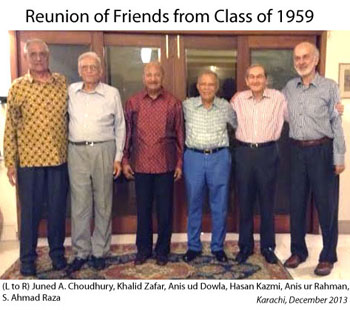
My interest in France was so abiding that I spent about
thirty years voluntarily running and developing the
Alliance Francaise of Chittagong as a Committee Member,
Honorary Secretary and President. As recognition, I was
decorated Knight of the Order of Arts and Letters by the
French government.
The IPBA scheme of turning us into bureaucrats did not
quite succeed. Most of us preferred to take up careers
in the private sector or in teaching, with many reaching
enviable heights at home and abroad. This was not only
because of higher remuneration in the private sector,
but because, as the spirit of enterprise had been
instilled in us, we were loath to accept seniority and
not merit as the main criterion for advancement. We have
no complaints; we were educated and treated very well,
contributing immensely to whatever we achieved in life.
And, above all, the love for the Institute and the
bonding and friendship that was created amongst us has
been ever-lasting. It is because of this that after
fifty-four years I went to Karachi to attend an IBA
Alumni dinner to felicitate alumnus President Mamnoon
Hussain, meet old friends and mourn with the families of
those who have, sadly, passed away. This is in addition
to the annual re-union, now running for a decade, of the
septuagenarian classmates who over-fly the sub-continent
and spend a week in retreat along with wives, away from
work and home.
Juned A. Choudhury
Dhaka
Dec' 13
E-mail: railjerker@gmail.com
Recently, Juned visited Karachi with his wife to attend the Alumni dinner in honour of the President (Dec'13) and a re-union party with his classmates. Visiting the IBA Main Campus after nearly twenty years his reaction was expressed in one word - Wow!
|
Related Links |
|
Take a sneak peek into the new IBA. View how your beloved institution has transformed leaps and bounds in recent years. |
|
Send us your request and we'll deliver your card. |
|
A hassle-free entry to campuses, access to on-campus facilities and offers from renowned companies. |
|
Featured Interviews
|